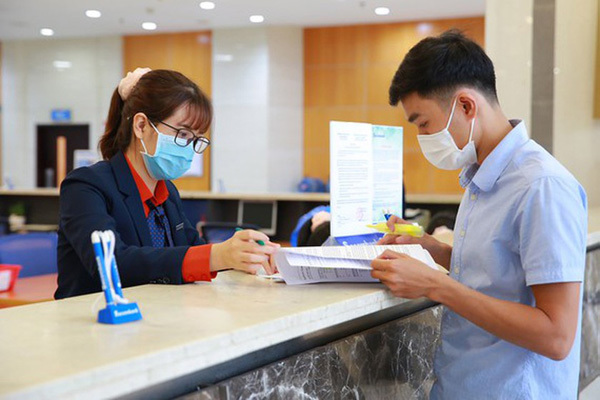Vietnamese people in foreign countries sent extra money to families back home last year to alleviate the devastating impact of the coronavirus pandemic.
 |
| A man receives money sent from foreign countries at a bank. |
In particular, the amount of remittances often increases sharply at the end of the year and is likely to exceed expectations, greatly contributing to social security.
The State Bank of Vietnam (SBV) branch in Ho Chi Minh City said that in the past 11 months, remittances to the southern largest city were about US$6.2 billion. The remittance payment turnover of commercial banks and remittance companies sent to the SBV branch in the city in the year’s third quarter was higher than expected. The main sources of Vietnam’s remittances are from the US, Australia, Canada and European markets.
According to experts, remittances increased sharply this year in part because Ho Chi Minh City was heavily affected by the epidemic and implemented social distancing for a long time, so people abroad have transferred money to support their relatives to overcome the consequences caused by the epidemic.
Resident Le Huong in HCMC’s District 4, who is a home-based grocer said that her brother who lives and works in Germany sends money to support the family during Tet holidays (the Lunar New Year) because she is taking care of her elderly mother. However, this year, knowing that the epidemic lasted for a long time, life was difficult, so his brother sent money back earlier.
Thanks to the money during the last epidemic, I was able to live for a few months without income. I use the remaining money as capital to get more goods to sell after the distance is over," Huong said.
Elsewhere in the city, Nguyen Hung in District 3 also said that his sister in the US has sent US$ 2,000 through Sacombank's remittance company. Hung's sister's family opened a barbershop in the US; although the Covid-19 epidemic had an impact, they were subsidized by the US government, so they still had an income and saved a little.
Not only helping her relatives, Ms. Thuy Nhan in Binh Thanh District said that her sister’s family in the US planned to return to Vietnam for a family reunion during Tet holidays and travel, but due to the epidemic, the flight was canceled.
Her sister sent back $30,000 for saving. However, because bank interest rates are currently quite low, Ms. Nhan persuaded her sister to switch to securities investment, hoping for a better return.
Nguyen Hoang Minh, former deputy director in charge of the State Bank of Vietnam's branch, said that in previous years, remittances to Ho Chi Minh City mainly flow into production and business. However, due to the complicated development of the domestic Covid-19 epidemic, and business activities stalled, this year's remittances focused on social security and supporting domestic relatives to overcome difficulties.
According to Mr. Minh, because the domestic exchange rate is stable, banks keep foreign currencies without interest, so more than 70 percent of people receiving remittances convert to Vietnam dong. About 12 percent flows into personal foreign currency accounts while more than 13 percent of remittances are put in saving accounts. He revealed that because deposit interest rates in 2021 will decrease, a large amount of remittances will flow through other investment channels such as securities and real estate.
In 2021, the World Bank (WB) estimates that remittances to low- and middle-income countries will recover and increase by 5.6 percent to $470 billion. However, this outlook still depends on the impact of the Covid-19 epidemic on global growth and measures to contain the spread of the disease in countries.
According to WB’s forecast, Vietnam’s main business hub, Ho Chi Minh City, received remittances worth $18.1 billion in 2021. The Southeast Asian nation is ranked eighth amongst the world’s remittance-receiving countries and third in the Asia- Pacific. Last year, the nation’s remittances reached $17.2 billion - the country is amongst the world’s ten top remittance recipients.
Vietnam receives a large source of remittances because there are a large number of Vietnamese people residing abroad and working abroad. Currently, about 4.5 million Vietnamese people live in more than 100 countries and territories, mainly in developed countries. Approximately 580,000 people are working abroad.
The leader of a remittance company in Ho Chi Minh City also said that remittance growth in the past 11 months increased by 50 percent over the same period last year. The SBV branch in Ho Chi Minh City also forecast that in the last month of the year, the amount of remittances sent back home will often increase, it is estimated that remittances to Ho Chi Minh City will exceed $6.5 billion, an increase of more than 6.5 percent compared to 2020.
According to Mr. Nguyen Hoang Minh, over the years, remittances have not only helped relatives in the country. Remittances have been flowing into production and business contributing to support the city's economic development, but also being a source of help to stabilize foreign sources, positively affecting the foreign exchange market in Ho Chi Minh City in particular and the country in general.
Source: Sai Gon Giai Phong

Remittances steady as lenders apply fresh transfer services
Remittance flows from Vietnamese expatriates working abroad are predicted to remain resilient throughout the rest of the year, with the country’s central bank keeping its policy steady for now.

Vietnam among top 10 remittance recipients in 2020 with US$17.2 billion
This was a fourth consecutive year that Vietnam remains in the top 10 in terms of remittance.